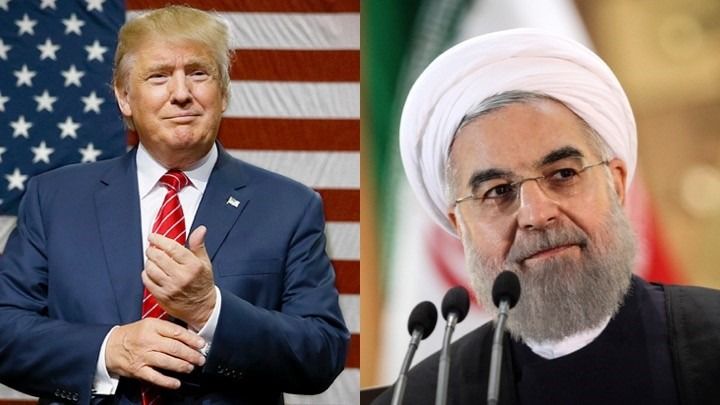A nuclear war in the Persian Gulf?
By Kaveh L. Afrasiabi, Nader Entessar | July 2, 2019
 From left, President of the United States Donald Trump and President of the Islamic Republic of Iran Hassan Rouhani
From left, President of the United States Donald Trump and President of the Islamic Republic of Iran Hassan Rouhani
Tensions between the United States and Iran are spiraling toward a military confrontation that carries a real possibility that the United States will use nuclear weapons. Iran’s assortment of asymmetrical capabilities—all constructed to be effective against the United States—nearly assures such a confrontation. The current US nuclear posture leaves the Trump administration at least open to the use of tactical nuclear weapons in conventional theaters. Some in the current administration may well think it to be in the best interest of the United States to seek a quick and decisive victory in the oil hub of the Persian Gulf—and to do so by using its nuclear arsenal.
We believe there is a heightened possibility of a US-Iran war triggering a US nuclear strike for the following reasons:
The sanction regime set against the Iranian economy is so brutal that it is likely to force Iran to take an action that will require a US military response. Unless the United States backs down from its present self-declared “economic warfare” against Iran, this will likely escalate to an open warfare between the two countries.
In response to a White House request to draw up an Iran war plan, the Pentagon proposed sending 120,000 soldiers to the Persian Gulf. This force would augment the several thousands of troops already stationed in Iran’s vicinity. President Trump has also hinted that if need be, he will be sending “a lot more” troops. Defeating Iran through conventional military means would likely require a half million US forces and US preparedness for many casualties. The US nuclear posture review is worded in such a way that the use of tactical nuclear weapons in conventional theaters is envisaged, foreshadowing the concern that in a showdown with a menacing foe like Iran, the nuclear option is on the table. The United States could once again justify using nuclear force for the sake of a decisive victory and casualty-prevention, the logic used in Hiroshima and Nagasaki.
Trump’s cavalier attitude toward nuclear weapons, trigger-happy penchant, and utter disdain for Iran, show that he would likely have no moral qualm about issuing an order to launch a limited nuclear strike, especially in a US-Iran showdown, one in which the oil transit from the Gulf would be imperiled, impacting the global economy and necessitating a speedy end to such a war.
If the United States were to commit a limited nuclear strike against Iran, it would minimize risks to its forces in the region, defang the Iranian military, divest the latter of preeminence in the Strait of Hormuz, and thus reassert US power in the oil hub of the Persian Gulf. Oil flowing through the Strait of Hormuz is critical to a rising China. US control over this merchant waterway would grant the United States significant leverage in negotiations. A limited US nuclear strike could cause a ‘regime change’ among Iranian leadership, representing a strategic setback for Russia, in light of their recent foray in the Middle East with Iranian backing.
Undoubtedly, there are several significant negative consequences to a US use of nuclear weapons, opening the way for other nuclear-armed states to emulate US behavior, and for many other non-nuclear weapons states to seek their own nuclear deterrent shields. There would also be a huge outcry in the international community causing the US global image to suffer.
Will such anticipated consequences represent sufficient obstacles to prevent a limited U.S. nuclear strike on Iran? With President Trump, who counts on “bomb Iran” billionaire Sheldon Adelson as one of his main campaign contributors, the threshold for using nukes certainly seems to have been lowered.
How the United States and Iran came to the brink. President Donald Trump complicates the situation by stating that the United States is not seeking war with Iran, while repeatedly threatening to annihilate it. In July of 2018, in response to a statement by Iran’s President Hassan Rouhani, Trump tweeted “NEVER, EVER THREATEN THE UNITED STATES AGAIN OR YOU WILL SUFFER CONSEQUENCES THE LIKES OF WHICH FEW THROUGHOUT HISTORY HAVE EVER SUFFERED BEFORE.” On May 19, 2019, Trump fired another incendiary volley, threatening the “official end” of Iran in a U.S.-Iran war. Then Friday June 21, 2019 the day after Iran shot down a US military drone, the President said “I’m not looking for war and if there is, it’ll be obliteration like you have never seen before. But I am not looking to do that. But, you (Iran) can’t have nuclear weapons.” In an interview with NBC’s Chuck Todd.
Citing Iran’s military threat, the Trump administration continues to enforce relentless economic sanctions under the guise of a “maximum pressure” strategy, designating Iran’s revolutionary guard a terrorist organization. The administration also is ramping up the US military presence in the Persian Gulf, sending several warships, a Patriot missile battery, an expeditionary force of marines, and nuclear-capable B-52 strategic bombers to the region. The United States has also withdrawn all “non-emergency” personnel in Baghdad and Erbil. These actions add fuel to the growing fear of war—a war sure to involve Iraq, home to both US military bases and powerful battle-hardened pro-Iran Shiite militias.
War could break out in a variety of ways: As a result of Iran’s closure of the Strait of Hormuz (a choke point for the daily transfer of some 19 million barrels of oil), a preemptive strike on Iran’s military and nuclear facilities (in light of Iran’s stated intention to resume aspects of its nuclear activities, banned under the 2015 nuclear agreement), an application of the 9/11 legislation on Authorization of Military Force against al-Qaeda (accusing Iran of being in league with al-Qaeda terrorists), or in response to perceived Iranian mischief (such as the recent sabotage on board several Saudi and UAE merchant ships).
The United States and Iran are not the only regional players, and care must be taken to understand the context and implications of events. As pointed out by a number of US experts in the wake of the most recent attacks on oil tankers, regional rivals such as Saudi Arabia have much to gain from a breakout of war between the U.S. and Iran. The U.S. has echoed the Saudi accusations against Iran and extended them to include blaming Iran for the Yemenis Houthi rebels’ drone attack on a Saudi pipeline on May 14th.
Accusations are one thing, but the big question is, will the Trump administration heed Saudi Arabia’s call for a “US surgical strike” on Iran? Both the Saudis and Iranians harbor hegemonic ambitions in the region. The Saudis are pushing for a limited US strike to eliminate some of Iran’s formidable naval and missile capabilities, thus weakening their regional rival. But even a limited US strike would increase the likelihood of Iranian forces inflicting serious damage on US military assets in the region, both directly and indirectly through multiple proxy forces.
Iran’s military commanders have warned that the US military fleet is within range of Iran’s short-range missiles. Iran has reportedly affixed anti-ship missiles on hundreds of its fast boats, as part of an asymmetrical “swarming” tactic. Ayatollah Khamenei, Iran’s Supreme Leader, has also instructed the country’s military forces to commence preparations for war.
It is worth recalling that Iran is ranked 14th for countries with the most military firepower. Iran has also devoted considerable attention to upgrading its asymmetrical capabilities, including shifting its formal strategy to an “offensive-defensive” posture—meaning that if the United States moves offensively against Iran, Iran will counter by moving offensively against a regional target of value for the United States. An example of an offensive-defensive move would be if the United States were to use its airbases to launch nuclear-capable B-52 strikes on Iran, Iran could counterattack the US base in Qatar, irrespective of friendly ties with the country.
Iran is in many respects a “regional superpower” with over a half a million active soldiers and another 350,000 reservists; it possesses thousands of guided missiles, over 1,600 tanks, some 500 aircraft, hundreds of military drones, and several surface warships, submarines, and mine boats, in addition to some 3,000 fast boats. These assets indicate that the now seemly imminent conflict with Iran will not be a cakewalk for the United States. This possibility of a costly conventional conflict in our minds increases the likelihood of US conflict escalation to nuclear war.
The risk of nuclear warfare in the Persian Gulf represents a present and clear danger to world peace, requiring the mobilization of the international community to intervene.
Together, we make the world safer.
The Bulletin elevates expert voices above the noise. But as an independent nonprofit organization, our operations depend on the support of readers like you. Help us continue to deliver quality journalism that holds leaders accountable. Your support of our work at any level is important. In return, we promise our coverage will be understandable, influential, vigilant, solution-oriented, and fair-minded. Together we can make a difference.
Keywords: Iran, Persian Gulf, United States, nuclear war
Topics: Nuclear Risk, Nuclear Weapons, Opinion

















I share the authors concern about lowering thresholds for the deployment of nuclear weapons and believe such actions will haunt mankind in all future conflicts. Truly the ‘limited’ use of tactical nuclear weapons against Iran will greatly encourage proliferation worldwide and be counterproductive to the US administrations goal of managing Irans nuclear ambitions long term. However, the author pines on about the US responsibility to manage escalation but fails to point out that Tehran also has the capability to de-escalate by acknowledging US concerns. They could return to the negotiating table with something substantial to offer. If the situation is… Read more »
Excellent even-handed article on a very alarming prospect. The big question is how can the international community intervene to stop those White House warmongers backed by Fox TV and so on? Sadly, the UN is manipulated by the US and it’s hopeless. Europe is powerless, that leaves Russia and China to stand up for peace and prevent this idiotic president ignite another war.
This armchair historian strongly disputes this well written article. My excellent vacation of August, 2011 included visiting the a-bomb cities in Japan. Do you realize what results of even “limited” nuclear strikes would look like? Markets, including petroleum, are ruled by greed, panic and manipulation as well as fundamentals. The world economy has current difficulties, does not need something like this. Many people would find ways of expressing displeasure with the US; many things would come loose in unexpected and unpleasant ways. Whatever problems with current Iranian regime, remember they do have elections that do mean something. Iranian voters overwhelmingly… Read more »
If the US uses nukes in Iran, then it will become an international pa
Fine. The hardest scenario is leaving Iranian regime to keep threatening international pace.
There are a number of factors that would prevent a nuclear strike of meaningful impact against Iran by the US: 1. Radioactive Fallout and it’s impact in the Gulf to US allies. The US will risk blanketing it’s own bases and allies, possibly even states like Russia with resulting radioactive fallout depending on the prevailing weather at the time. 2. Risk of Nuclear Counter-Strike by Russia and China: Russia will not be able to assure itself, once it detects a nuclear launch that the strike is not surreptitiously meant for *it* while being ostensibly targeted at *Iran*. Russia would have… Read more »